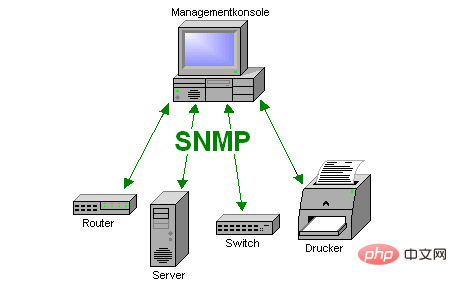
The snmp port numbers are generally snmp get UDP 161 and snmp trap udp 162; the standard SNMP service uses ports 161 and 162, and the manufacturer's proprietary implementation generally uses ports 199, 391, 705 and 1993.

The operating environment of this article: Windows 7 system, Dell G3 computer.
What is the snmp port number?
The SNMP ports are generally: snmp get UDP 161, snmp trap udp 162
The standard SNMP service uses ports 161 and 162, and the manufacturer's private implementation generally uses 199, 391, Ports 705 and 1993.
In typical SNMP usage, there are many systems being managed, and one or more systems are managing them. Each managed system runs a software component called an agent and reports information to the management system through SNMP.
Basically, the SNMP agent presents management data in variables. The management system retrieves information through GET, GETNEXT, and GETBULK protocol commands, or the agent uses TRAP or INFORM to transmit data without being asked. The management system can also send configuration update or control requests through SET protocol commands to achieve the purpose of actively managing the system.
Configuration and control commands are only used when the basic structure of the network needs to be changed, while monitoring commands are usually normal tasks.

Extended information
Using SNMP for network management requires the following important parts: management base station, management agent, management information base and network management tool.
1. The management base station is usually an independent device, which is used as the user interface for network managers to perform network management. The base station must be equipped with management software, a user interface that administrators can use and a database that obtains information from the MIB. At the same time, it should have the ability to issue management commands to the base station for network management.
2. The management agent is a network device, such as a host, a bridge, a router, a hub, etc. These devices must be able to receive information from the management base station, and their status must also be monitored by the management base station. . The management agent responds to the base station's request to perform corresponding operations, and can also send information to the base station without a request.
3. MIB is a collection of objects, which represents the resources and devices that can be managed in the network. Each object is basically a data variable that represents information about one aspect of the object being managed.
4. The last aspect is the management protocol, which is SNMP. The basic functions of SNMP are: obtaining, setting and receiving unexpected information sent by the agent. Obtaining means that the base station sends a request, and the agent sends back corresponding data according to this request. Setting means that the base station sets the value of the management object (that is, the agent). Receiving unexpected information sent by the agent means that the agent can send data to the base station without requesting it from the base station. Report unexpected situations that occur.
For more related knowledge, please visit theFAQcolumn!
The above is the detailed content of What is the snmp port number?. For more information, please follow other related articles on the PHP Chinese website!




